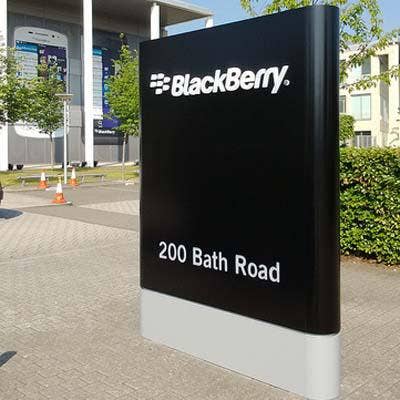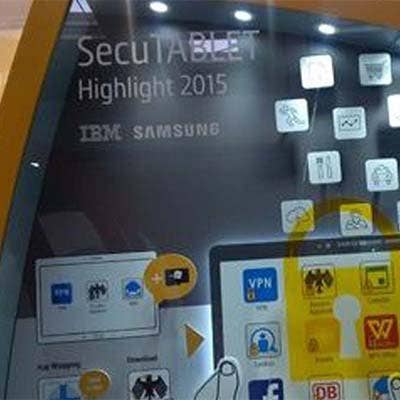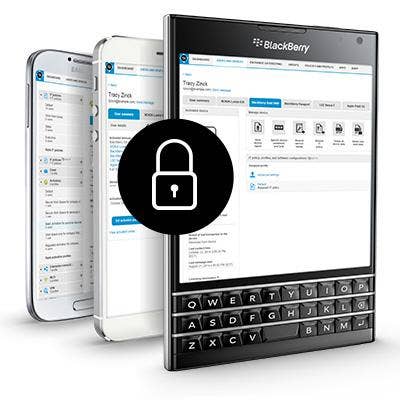6 Enterprise Moves BlackBerry Has Made This Quarter

Steps Toward The Enterprise
As BlackBerry prepares to report its quarterly results Friday, analysts project quarterly revenue to fall 19 percent year-over-year to $794 million, according to the Wall Street Journal. Despite a rocky earnings forecast, BlackBerry heralded several moves this quarter that may make for a hopeful future.
Last year, the Waterloo, Ontario-based smartphone company made a play for the consumer market with its products, which many partners labeled a mistake because of Apple's steady dominance in that field.
But in the past few months, BlackBerry has changed direction, instead tightening its security-based product line and touting software bundles targeted for the enterprise. Here are some of BlackBerry's enterprise-related products released this past quarter.

6. SecuTablet
BlackBerry created a ripple in the struggling tablet market in March when it partnered with Samsung and IBM to unveil SecuTablet, an ultra-secure version of the Galaxy Tab S 10.5.
Samsung's 10.5-inch, ultra-thin HD tablet will be equipped with a micro-SD security card from BlackBerry's secure communications subsidiary, SecuSmart, while personal applications on the device will be safeguarded by IBM's bundling software.
The new tablet, set for release in the summer, is targeted toward public-sector enterprise users handling sensitive data, such as governments. SecuTablet will sell for about $2,380, according to BlackBerry.

5. Blackberry Leap
BlackBerry exhibited its enterprise-focused midrange smartphone, BlackBerry Leap, during Mobile World Congress in the beginning of March.
The 5-inch touch-screen $275 smartphone will be released in the U.S. in April, and will feature several security and productivity attributes. Unlike BlackBerry's previous high-end smartphone releases, the BlackBerry Classic and BlackBerry Passport, BlackBerry Leap is intended for young professionals in the enterprise. The device contains support for encryption, built-in malware protection and backup protection against data breaches.

4. New Security Executive Hire
BlackBerry in February reported that it had hired a new chief security officer in a move that partners cheered as a renewed focus on mobile security.
The new appointment, David Kleidermacher, was previously chief technology officer at Santa Barbara, Calif.-based operating systems builder Green Hills Software. Kleidermacher touts skills revolving around software development, mobile security and Internet of Things-related technology. He replaced the company's former vice president for security, Scott Totze, who left BlackBerry in June.

3. BlackBerry Experience Suite
During Mobile World Congress in March, BlackBerry revealed plans to create a BlackBerry Experience Suite, which will allow enterprise users to secure email, messages, documents and phone calls across multiple devices.
The suite includes a BlackBerry Productivity Suite, a BlackBerry Communication and Collaboration Suite and a BlackBerry Security Suite, all seen as vital lifelines for the enterprise environment. The services will be delivered later in 2015, according to BlackBerry.

2. Worklife and SecuSUITE Solution
Also during Mobile World Congress, BlackBerry showed off its plan to work with Samsung to create a mobile enterprise security solution.
The new combined forces will integrate BlackBerry's Worklife solution, which divides work and personal phone numbers on a single SIM card, with Samsung's SecuSUITE with Knox solution, which offers hardware-based encryption for data.
Also through the new partnership, BlackBerry will sell Knox services and Samsung will sell BlackBerry products through the Samsung Business Services portal.

1. BES12 Partnerships
Analysts speculate that BlackBerry's future success will stem from its BES12 cross-security platform, which allows for company management of employee devices and apps utilizing iOS, Android, Windows Phone and BlackBerry.
The product was released in November, but since its release BlackBerry has coupled BES12 with several other platforms, including Samsung Knox, to enhance the level of security solutions for end users.
More recently, BlackBerry coupled its BES12 with Google's enterprise platform Android For Work, so that devices carrying Android For Work would contain an extra layer of security.